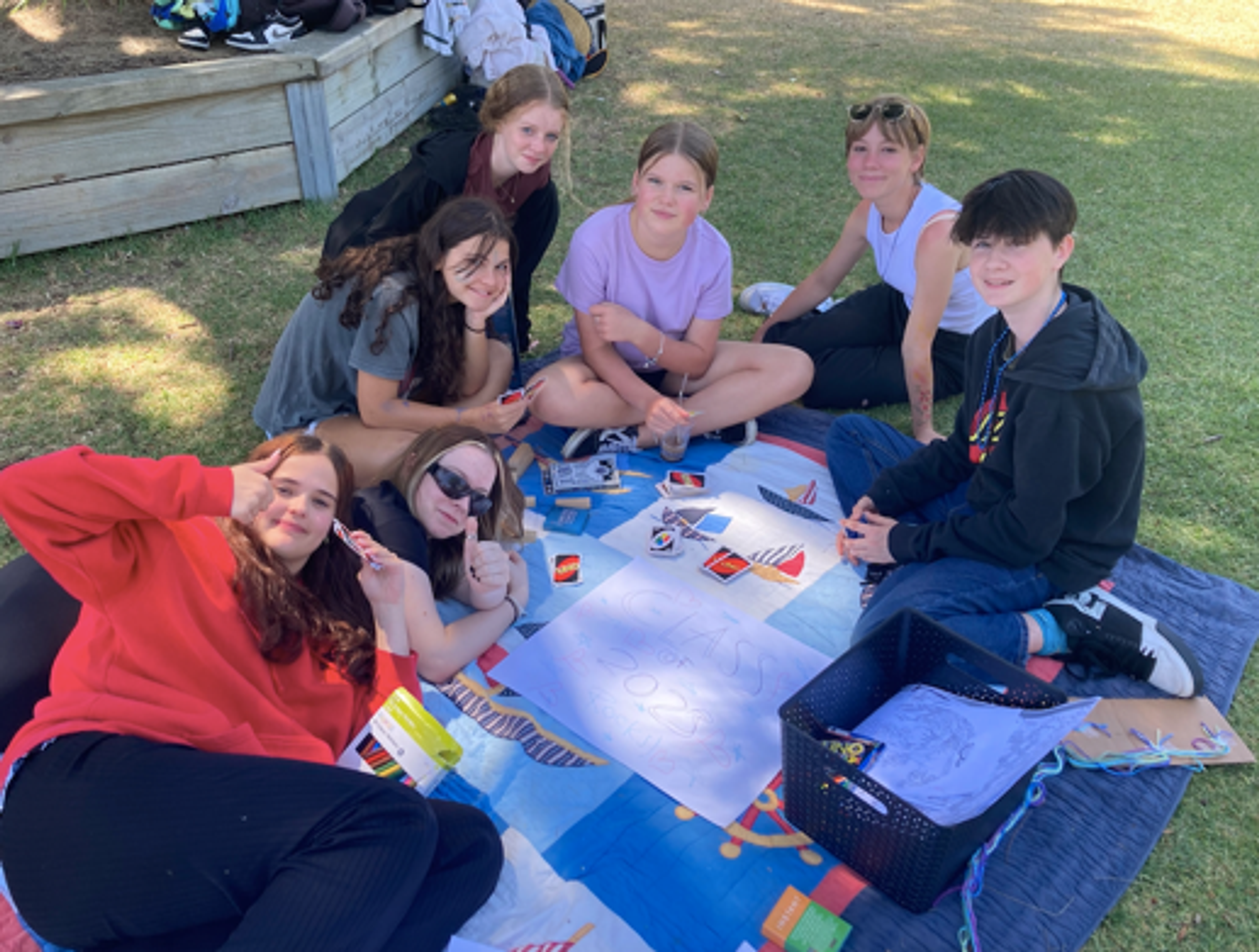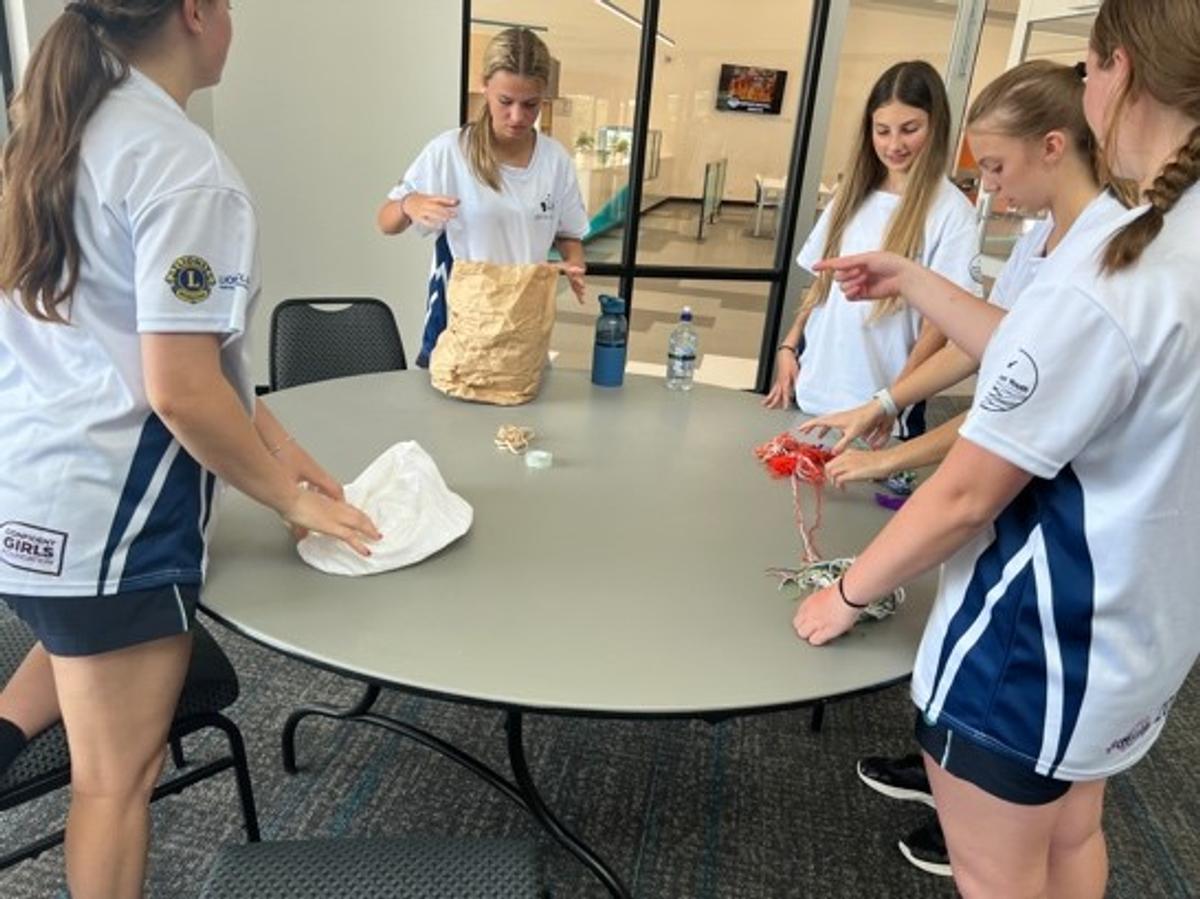WELLBEING

Accessing Wellbeing:
Students can access wellbeing via an online booking form for Wellbeing and health related matters.
Student Wellbeing Check In Request Form
Parents/ Career can access supports from wellbeing for their young person via the front office.
SURFSUP WITH THE WELLBEING TEAM
We are now into week 4 and the wellbeing space has started to take shape with the commencement of lunch time groups, programs and students coming in to say hi. We love the buzz of a new school year- students seem to be refreshed and ready to learn.
The year 7’s have settled well into Surf Coast College and are enjoying exploring new friendships and catching up with old ones. Swimming sports this week will be their first sporting experience in their new houses. This is a great way to meet students from all year levels and be encouraged by their houses to participate and have fun!
Check out some wellbeing photos from the Chilled space we set up on the day.
This newsletter will explore the importance of connections- how this makes us feel, how social media plays a part in our connections and why we need to support this in our school community.
Connections Matter
https://headspace.org.au/explore-topics/for-young-people/create-connections/
Connections matter. Strong ties with family, friends and the community provide us with happiness, security, support and a sense of purpose. Being connected to others is important for our mental and physical wellbeing.
Relationships and your mood
Healthy relationships are super important for your mental health. When you spend time with people you care about, who care about you, this can help you feel connected and supported.
The benefits of social connections and good mental health are numerous. Proven links include lower rates of anxiety and depression, higher self-esteem, greater empathy, and more trusting and cooperative relationships. Strong, healthy relationships can also help to strengthen your immune system, help you recover from disease, and may even lengthen your life.
The good news is that while many of these benefits can make you happier and more contented, there’s also a flow-on effect, whereby people around you will want to spend time with you. In this way, social connectedness generates a positive feedback loop of social, emotional and physical wellbeing https://www.betterhealth.vic.gov.au/health/healthyliving/Strong-relationships-strong-health
And yet, we know relationships aren’t always easy. Starting new relationships can often be scary. And if you’re experiencing mental health difficulties you may feel like disconnecting from people, rather than reaching out.
But here’s the thing – the more you work on your relationships, the stronger they get.
Here’s how working on your relationships can improve your headspace:
* boosts your energy
* improves your sense of belonging
* helps you relax
* helps you feel supported
Staying connected through Social Media
Social media has given young people the ability to instantly connect with others and share their lives through photos, videos, and status updates. Young people themselves describe these platforms as a key tool for connecting and maintaining relationships, being creative, and learning more about the world. But they also must contend with more negative aspects of social media use, such as drama and bullying or feeling pressure to present themselves in a certain way.
Social media: benefits
Social media is a big part of social and creative life for young people.
Teenagers use social media to have fun, make and maintain friendships, share and learn interests, explore identities and develop relationships with family. It’s an extension of their offline and face-to-face interactions. For older teenagers especially, it’s often a key part of how they connect with friends.
Social media can connect teenagers to online global groups based on shared interests. These might be support networks – for example, for young people with disability or medical conditions, LGBTIQ+ teenagers, or children from particular cultural backgrounds. Or they might be sites for commenting on and sharing content about particular interests like games, TV series, music or hobbies.
Your child can get many other benefits from using social media:
Learning: Your child can use social media to better understand, extend or share what they’re learning at school, either informally or in formal school settings.
Hobbies and interests: Your child can use social media to follow their interests and learn new ones.
Creativity: Your child can be creative with profile pages, images, video and game modifications.
Mental health and wellbeing: Connecting with extended family and friends and taking part in local and global online groups can give your child a sense of belonging.
Social media: risks
Social media can also pose risks. For your child, these risks include:
*Being exposed to inappropriate or upsetting content, like mean aggressive, violent or sexual comments or images
*Uploading inappropriate content, like embarrassing or provocative photos or videos of themselves or others
*Sharing personal information with strangers – for example, images, date of birth, location or address
*cyberbullying (Click here for more info.)
Managing social media risks for young people
Talking about social media use
Talking with your child is the best way to protect them from social media risks and ensure their internet safety. Talking gives you the opportunity to help your child:
- Work out how they want to treat other people and be treated online – for example, you can encourage your child to make only positive comments
- Understand the risks involved in using social media – for example, your child might be tagged in an embarrassing photo taken at a party
- Learn how to navigate the risks – for example, if your child posts an identifiable selfie, they can reduce risk by not including any other personal information
- Learn what to do if people ask for personal details, are mean or abusive online, post embarrassing photos of them, or share information that links back to them.
Finding out more about social media
Social media apps and functionality are always changing, so it’s a good idea to keep up to date with the social media your child uses. You could ask your child which platforms are popular and which ones they like. You could also get your child to show you how they work.
Thinking about age recommendations
Most social media apps require people to be at least 13 years old to sign up. But these age restrictions aren’t always enforced, so pre-teens can often still use the apps. It can be tricky if your child’s friends are using social media apps before they’re old enough and your child wants to do the same.
If you want your child to wait, here are some options you could think about:
Could you compromise? What if your child uses a family social media account until they’re old enough for their own? This could give your child a way to connect with friends with your help to navigate social media.
Could your child use a child-friendly social media app, like YouTube Kids or Messenger Kids? These have stronger safety settings and age-appropriate content.
What about banning social media?
It can be hard to ban social media, even for younger children. This is because social media is increasingly a part of children’s apps, games, websites and learning environments. Instead, it’s better to teach your child how to navigate social media risks and behave respectfully on social media.
Internet safety for children aged 9-11 years and internet safety for teenagers is about identifying and managing risks and also protecting your data and privacy.
Setting up social media guidelines
Some written guidelines about social media can help your child get the benefits of social media while using it responsibly, respectfully and safely. This agreement could be part of a family media plan. If these guidelines include your social media use as well as your child’s, you can be a positive role model.
Here are things your guidelines could include;:
This might cover basics like;
Using Social Media
- When it’s OK to use social media and how long your child can spend on social media.
- Whether it’s OK to use social media during homework time, family meals and so on.
- Where it’s OK to use social media – for example, only in family areas of the house, not bedrooms.
Posting content and comments
It’s important for your child to agree to:
- think about why they want to post something and what reactions they might get before they post.
- not upload or share inappropriate messages, images and video.
- show respect in posts and when sharing content – for example, if it’s not OK to say or do. something face to face, it’s not OK online.
- seek consent before posting images of others.
Protecting privacy
It’s a good idea to go through social media privacy guidelines and settings with your child.
Your child can protect their privacy by agreeing to:
- not share personal information like location and date of birth – for example, by giving this information to strangers online, doing online quizzes or tests and so on.
- not add personal details like phone numbers or date of birth to private profiles.
- regularly check privacy and location settings on apps and devices.
- keep passwords and log-in details private and not share these with friends.
- not use social media or other online accounts on public wi-fi.
- log out of all accounts after using public computers.
Staying safe on social media
Safety essentials for your child include:
- blocking and reporting people they don’t know or people who post upsetting comments or content
- not clicking on pop-ups – some pop-ups that seem safe can lead to pornography sites or are scams
- accepting friend requests only from people whose identity they know
- taking screenshots of concerning things they see online, and talking to a trusted adult about them.
Excerpt taken from Raising Children Network https://raisingchildren.net.au/teens/entertainment-technology/digital-life/social-media
Girl in Charge Program at SCSC
Selected Students from year 9 were excited to be part of the Girl In Charge program- facilitated by Vic Police and Netball Victoria.
The first week covered the theory behind the sport of netball and looking at how we build confidence in ourselves and each other.
In week 2 the girls were given the focus of working as a team- creating a netball from scrap material that was then tested in netball conditions. The girls had to pull on strengths of leadership, respect, creativity and perseverance.
It was great to see students stepping out of their comfort zone, acknowledging each other’s strengths and working together to achieve a great end result.
At the conclusion of this program the girls will have the skills and qualifications to be netball umpires with Netball Victoria.
Little Da Vincis
Two students from year 8 have been enjoying the experience of supporting the popular and fun craft program at the Community House in Torquay on a Monday morning.
Students Ruby and Jas are experiencing the benefits of intergenerational learning- the little people really love these two and look to them for guidance and to show them how to create their little masterpieces. This experience is giving them many skills to take them into their futures from good communication, being organised and supporting each other through effective teamwork.
What's On
As Always stay kind and reach out if you need too!
~ Michelle, Mel, Jas, and Rachel.
A safety message from the Australian Centre to Counter Child Exploitation











